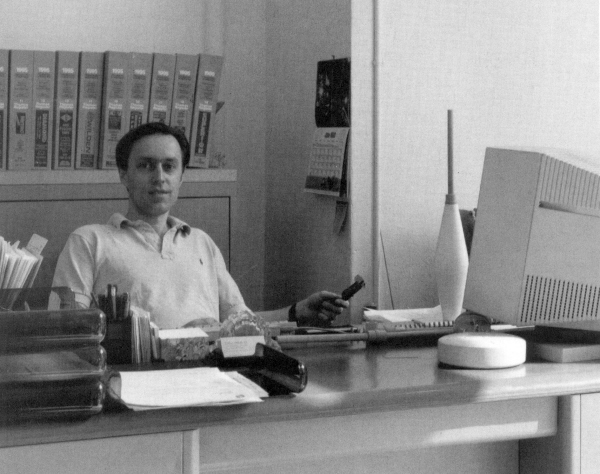
Brian Dube' at his desk. |
Page 40 Summer 1996
|
"It
sounds ridiculous now, because now there is so much equipment around
that the challenge is to sell it against your competitors, but in
those days, it was unheard of that somebody would actually have
equipment right there to buy," Dube said. His supplies did not
last long. "I got to the vestibule, and put my shopping bags down
to talk to this guy, and some people who had been hounding me from my
car already wanted to buy them. I started selling right there and
everything was sold before I even got into the room."
Dube
notes that
Juggling
occupied
For
his first six years in the business, Dube worked out of his apartment
across from Washington Square Park, a place famous for its buskers.
His business accelerated very rapidly, because there was an enormous
pent-up demand for props. He enjoyed being involved in juggling, arid
knew the satisfaction that comes from working with one's hands.
"In our society, if you have any intelligence at all, you are
funneled into academic areas," said the former New York
University math major who left college after three years.
"Working with your hands in America is not really respected... in
school, I didn't really know that crafting was anything I would be
potentially interested in."
Still
working out of his home, he watched
At
least one of his neighbors decided that Dube was doing a little too
much business for a residential building. A complaint was filed and
Dube had to leave his apartment. It was 1981, and Dube was searching
for both commercial and residential space in downtown Manhattan. The
company moved to Park Place, which became its home for 10 years, and
Dube's overhead increased more He
had sought out a much larger space with
As
juggling grew in popularity, more people began to supply equipment.
Jugglebug appeared on the scene about two years after Dube went into
business, and after some initial; concerns, the companies found that
they were comfortably focused on different segments of the market.
Jugglebug followed Dave Finnigan's mission of spreading juggling to
the masses, while Dube tried to produce performance-quality props for
professionals and serious amateurs.
Things
got a little more intense around 1980, when Todd Smith Products
appeared on the scene in Cleveland. Smith also sought to serve the
high-end juggling market, and Brian Dube, Inc. saw some of its first
serious competition. Prop-making was still a laid-back business: Dube,
Finnigan and Smith were all juggling enthusiasts, and juggling's
popularity was growing. Dube said he feels that equipment availability
"was definitely a big issue," in more people becoming
involved in juggling, as the International Jugglers Association's
membership grew from around 100 in 1975 to 3,000 by the 1990s.
"Propmakers coming onto the scene helped. It's hard to say how
much of a role equipment played.
As
the big three propmakers' business grew and Brian Dube, Inc.
developed its more-professional image with full color catalogs, a
slight backlash against corporate juggling culture developed. It was
most successful in the 1983
founding of Santa Cruz, Calif.-based Renegade Juggling
Equipment, which positioned itself against the prop powerhouses.
Dube
said he feels that there is not as much of a difference
While
based at Park Place, Dube' developed his juggling knife, which he
considers to be the jewel in his prop-making crown. "I didn't
know much about steel, I didn't know much about a lot of things. It
took several years to really get it down."
The
first challenge was to develop his own riveting scheme: juggling
knives, which weigh almost one pound and are dropped and dropped and
dropped, experience too much stress for any pre-existing riveting
scheme to last long.
Once
that was overcome, the next challenge was to find a wood-turner who
could drill handles precisely enough to fit the blades perfectly.
While he was searching for a shop, his father was making handles that
met his needs perfectly, which increased his frustration. Dube
"would call wood-turners and ask, 'Why is it that a
75-year-old man can do this and you can't?'" After finally
finding suitable manufacturers for all the parts, and getting the
knives riveted together, he was done in time for Christmas. Or so he
thought. |

Brian Dube' at his desk. |